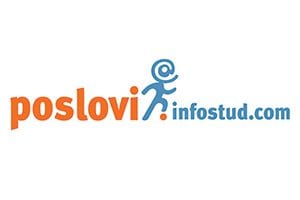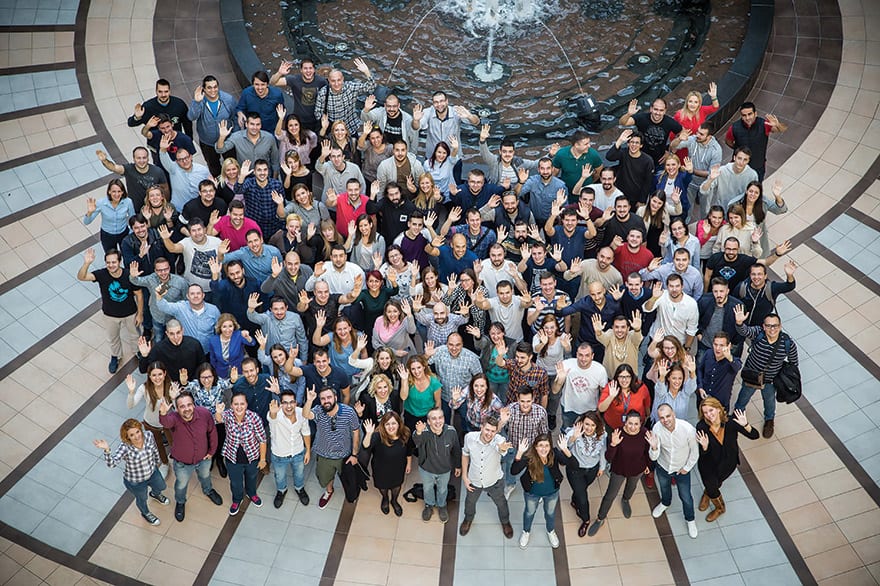We’re witnessing the fastest and most challenging changes to face the labour market in the last 15 years. Employment has grown, a large number of capable workers have left Serbia, the attractiveness of some professions has risen, while some have declined, the business environment has changed, and the behaviour and expectations of the (un)employed have evolved
How, then, does one now respond to the main challenge – attracting and retaining high-quality people in our teams, without which there is no further growth, progress or achieving of strategic goals. Although employer branding has been discussed in Serbia as a response to this challenge for years, it is only now becoming a real necessity for dealing strategically and systematically at all levels and in all areas of employment and work.
 That’s why Poslovi Infostud worked during this year – within the scope of its first ‘HR Experience’ conference, the Vivaldi HR Forum and many HR Meet-ups – to bring together a hundred HR professionals and address a series of topics that highlight the Employer Branding story, and had a great three-day discussion, covering the following directions and topics:
That’s why Poslovi Infostud worked during this year – within the scope of its first ‘HR Experience’ conference, the Vivaldi HR Forum and many HR Meet-ups – to bring together a hundred HR professionals and address a series of topics that highlight the Employer Branding story, and had a great three-day discussion, covering the following directions and topics:
In the past few years, there were real deficiencies in just a few areas, while we’re now facing them at almost every step. That’s why ever more companies are establishing an employer branding function. Its nature ensures that it requires essential understanding and systemic cooperation in the relationship between HR, marketing and PR. Its main task is to engage the entire company on the employer branding challenge.
And why the entire company? What does branding an employer mean, how is it composed and determined?
A well-conceived, designed and implemented marketing campaign that attracts candidates and with which we communicate that we feel great at work? PR placed by a company about itself? A system of benefits? Satisfied employees? Pleasant working conditions, culture and atmosphere in the company? Work challenges? The image of a company acquired by a candidate in the selection process after meeting HR?
Every employer can find the mix that they consider appropriate for themselves.
Although the name indicates a connection with the marketing, it is important to emphasise that employer branding is not marketing, although marketing plays an important role in the process, albeit only at the end of the process.
In the past few years, there were real deficiencies in just a few areas, while we’re now facing them at almost every step. That’s why ever more companies are establishing an employer branding function
The essence of employer branding is in our employees’ feelings. The essence is within the company, in its pulse, diagnosis and improving its health; the image carried in the people who work there and the placing of this realistic picture externally.
And that’s why we can say that employer branding lives in the company. All other strategies, particularly those that try to externally present a beautified reality, will have a short-term effect, resulting in unfulfilled expectations and a loss of confidence in the company.
 As such, an effective approach to improving an employer’s brand must start from one’s own yard, from 1) analysis of the internal situation – how employees feel and what matters to them, whether they’re satisfied, committed and engaged, and 2) researching the market’s perception of the company as an employer.
As such, an effective approach to improving an employer’s brand must start from one’s own yard, from 1) analysis of the internal situation – how employees feel and what matters to them, whether they’re satisfied, committed and engaged, and 2) researching the market’s perception of the company as an employer.
These two areas of research represent two basic pillars of an effective employer branding strategy. It will provide an answer to questions regarding our strengths and weaknesses; how we’re perceived as an employer by prospective candidates and how aligned that image is with reality.
We can then approach the defining of tactical steps in the following segments:
1) towards employees (improving the culture, communication, financial and non-financial working conditions, benefits etc.)
2) towards candidates – improving the “candidate experience” (job advertising, simple application processes, transparency of selection processes, professionalism of recruiters, information on the progression and outcome of the selection process, the on-boarding process), and creating communication messages for each target group addressed, as well as the most effective promotional channels.
If we’ve defined employer branding as a development strategy, we must be aware that it has much broader implications than growing interest among a higher number of appropriate candidates for work at the company. It has a strong impact on the entire company – both on the improvement felt by employees – through the advancing of processes and systems, communication, engagement, satisfaction, and thus consequently on the company’s results and market success.
So let’s get started today.